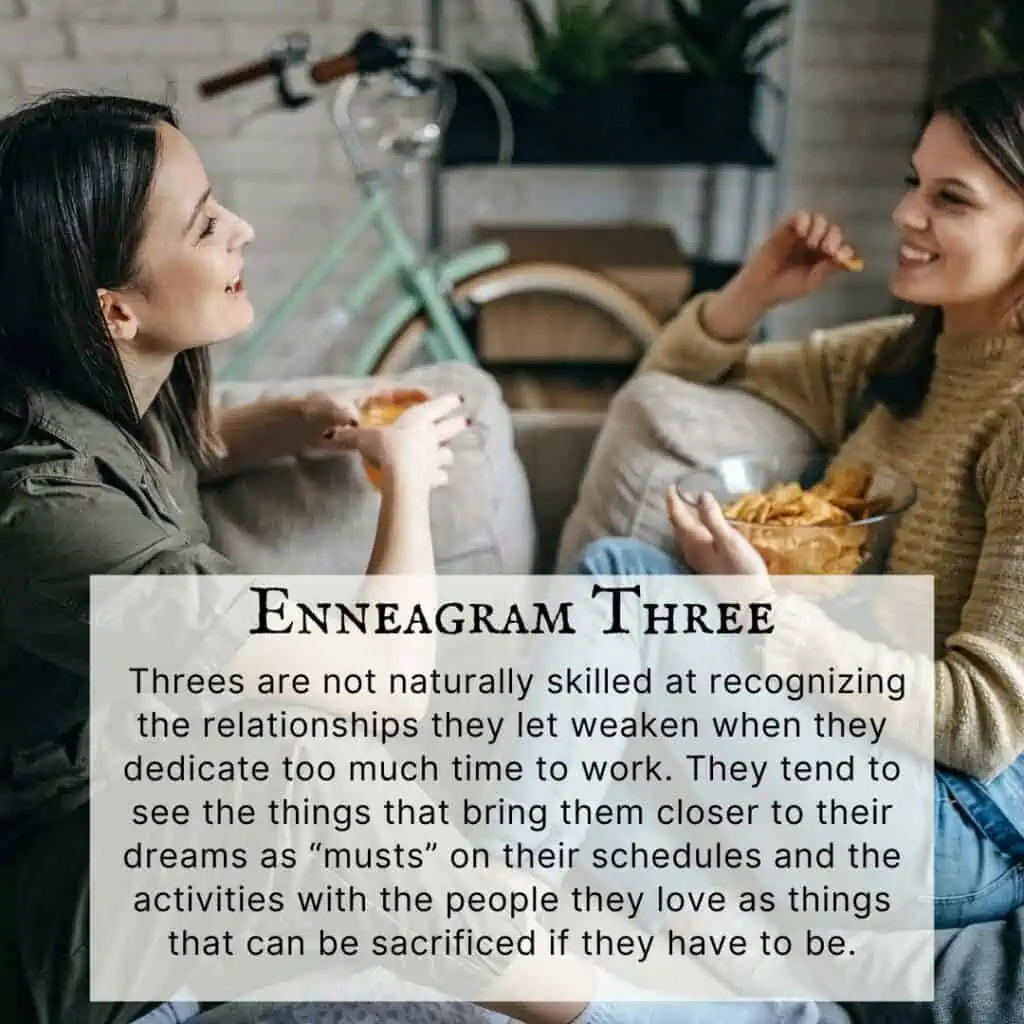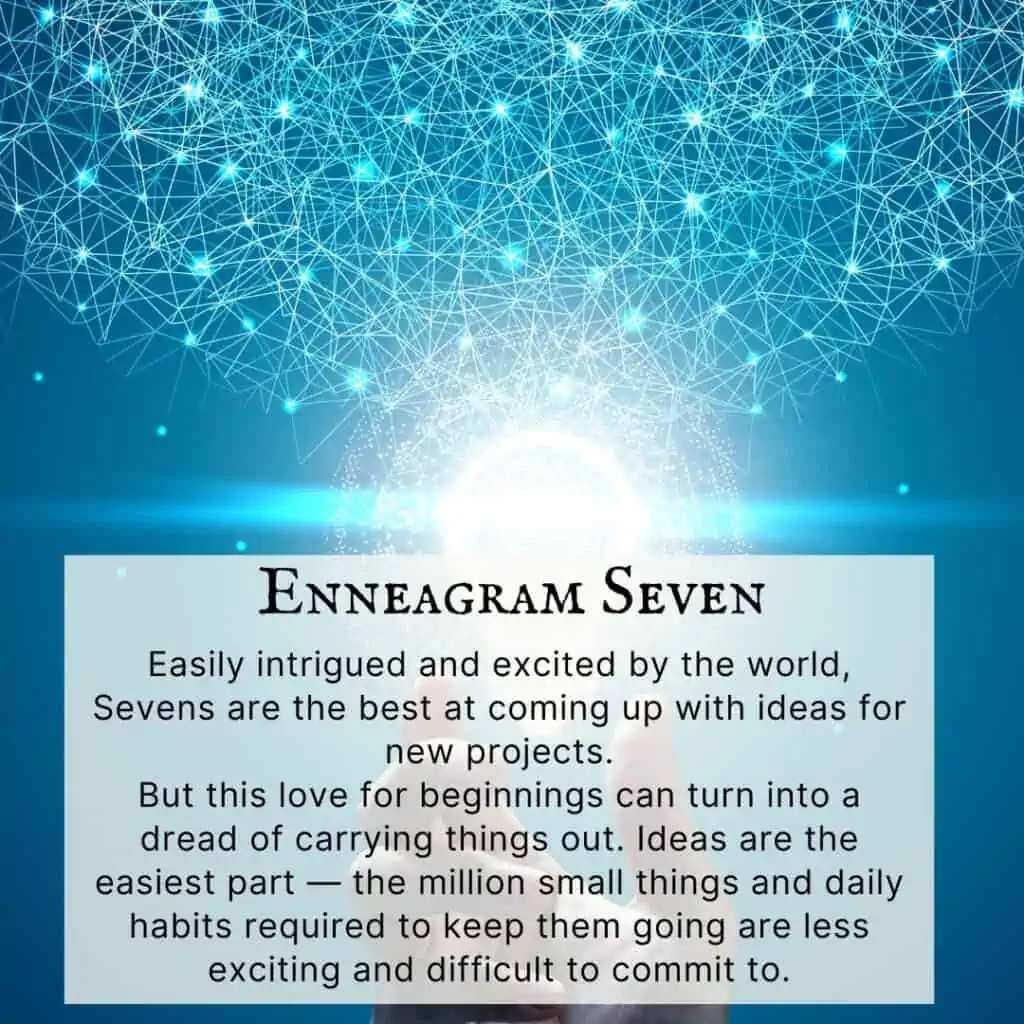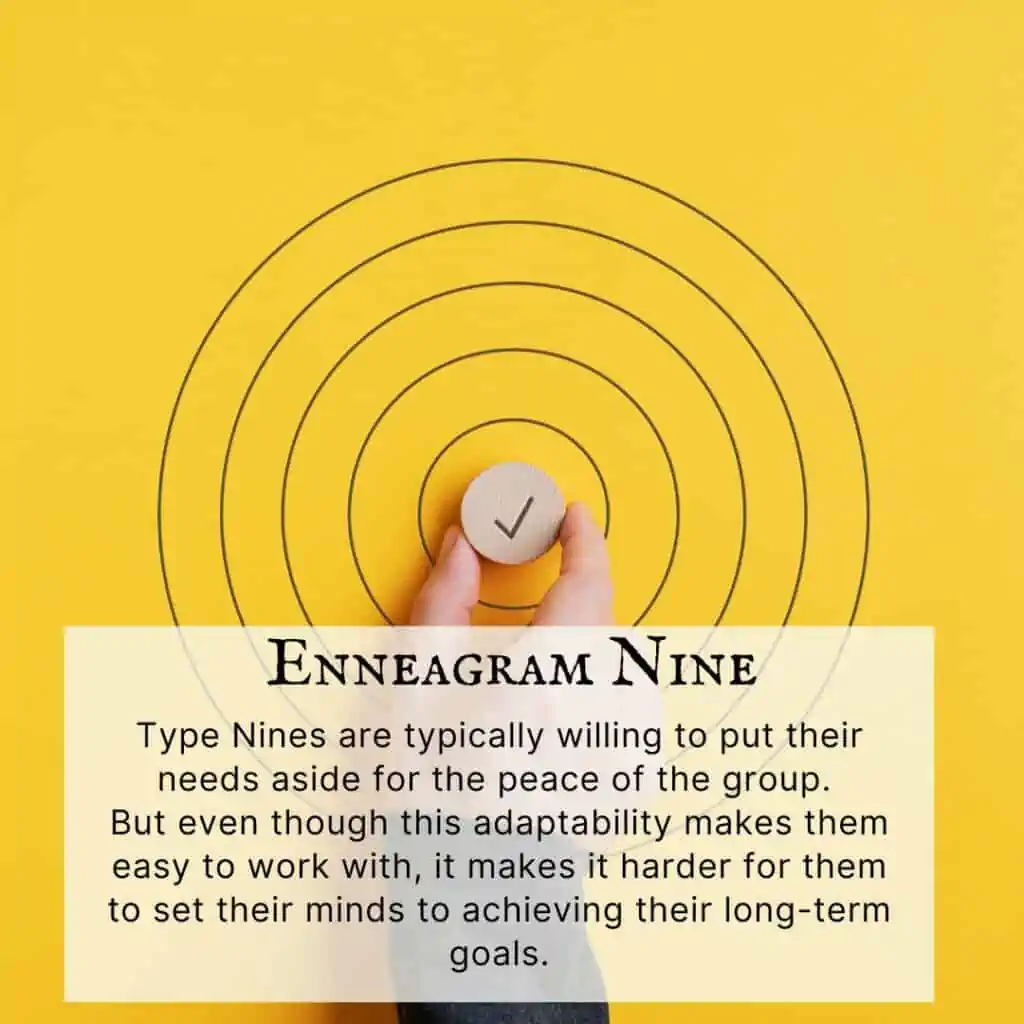Here’s How You’re Sabotaging Yourself, Based On Your Enneagram Type
Have you ever heard the phrase ‘we are our own worst enemies’? Well, the Enneagram can show us exactly how we’re getting in our own way in life. The Enneagram is a personality typing system that categorizes people into nine distinct types based on their core motivations and fears. Each Enneagram type has unique ways of sabotaging themselves, but let me take you through a few specific examples.
What Is Self-Sabotage?
Self-sabotage is the partaking of behaviors that you know are detrimental to your goals or personal growth. This can include falling behind on your homework because you’re prone to falling down Twitter rabbit holes once you get home. It could mean waking up too late to go to the gym every day, even though your health is not in a good place.

We rarely mean to work against ourselves, but we often tolerate so many destructive behaviors that our goals and personal well-being suffer.
Each Enneagram type is prone to a set of these behaviors. In today’s article, we’ll be unpacking one behavior for each type.
Not sure what your Enneagram type is? Take our free questionnaire here.
Here’s How You’re Sabotaging Yourself, Based On Your Enneagram Type
Type One: Micromanaging everything
Ones strive for excellence in all that they do, ensuring that their products are of the highest quality. In school, they were the kids who took charge of group projects and did them mostly on their own. In the workplace, they are the employees who complete each task by themselves because they believe in their ability to do it better than anyone else.
But while this sense of responsibility makes them proactive, it can ultimately stress them out.
When average to unhealthy Ones are in a position of authority, they try to do everything themselves because they don’t trust the people under them to do their jobs right. However, this only adds more stress to their plate, because they burn out after taking on so much.
Inevitably this leads to them asking themselves, “Why can’t I just trust other people?” or “Why isn’t anyone helping me?”
But, unfortunately, many people give up on helping Ones because they feel the One will take over anyway. This method also doesn’t give people room to grow and become better at their jobs. When the people Ones lead stay at the same level of competency, Ones keep being forced to do everything themselves to ensure the job “gets done right”.
How to Solve the Problem:
To lighten your load, trust other people to take on some of your tasks. Don’t think of it as throwing a task into the unknown and hoping it gets done — think of it as managing your workload intelligently. It could be as easy as giving your errand list to someone else or asking a family member to make dinner if you’re overwhelmed.
Remember, it will usually take time to train someone to take on tasks that you’ve thus far handled diligently. They may not do it perfect the first time, but you can use the experience to help them learn and grow. Ultimately, it will make your life easier in the long run!
Find Out More About Ones: The Enneagram 1 Child
Type Two: Manipulating relationships
Unhealthy to lower-average Twos can see relationships as sources of validation. When they’re struggling with self-esteem, the high they feel when someone affirms that they care about them can feel addicting. As a result, they may manipulate situations so that they can get the validation they crave.
This can look like casually dropping hints to their friends that their other friends are untrustworthy, or bad influences. Unhealthy Twos who are in a bad place will ask other people about their days, just so the question will be reciprocated — if it’s not, they will feel rejected.
Even though other people may not be able to identify the specific methods A Two is using to manipulate them — consciously or unconsciously — they can usually tell when something isn’t right. When they start to feel controlled, pressured, or guilty about setting boundaries, they will eventually distance themselves from the Two. This can amp up the Two’s manipulative behaviors or cause the Two to feel worthless and unlovable.
How to Solve the Problem:
You have such a big heart. If you seek to spend time with people solely because you enjoy their company, or check in with your friends just because you care about them, people will sense your genuineness and be drawn to it. Try to look at your motivations before you seek out something emotionally.
Are you looking for validation?
Do you need to feel needed?
Do you want warmth and connection?
Practice being more genuine about what you actually want in a relationship or friendship. It may feel vulnerable at first, but you’ll be rewarded in the long run with deeper, meaningful relationships. After all, you will be happier with one healthy, free-flowing friendship than a thousand carefully manipulated acquaintances.
Find Out More About Twos: The Enneagram 2 Child
Type Three: Isolating others with your work
Everybody admires Threes’ ability to work harder than anybody else. In tune with their goals, Threes are gifted at figuring out what they want and what they have to do to get it.
However, Threes are not as good at recognizing the relationships they let weaken when they dedicate too much time to work. They tend to see the things that bring them closer to their dreams as “musts” on their schedules and the activities with the people they love as things that can be sacrificed if they have to be.
This only harms Threes, because plenty of the reason they work hard is because they feel like they will be loved more if they become more successful. But as they grow more successful and work less on their relationships, the chasm between them and other people grows wider.
Even though relationships will not completely fill any hole you feel is in your life, much of the reason you push yourself so hard is wanting to see approval in your peers’ faces. However, success won’t make anybody love you more. They will only admire you more.
How to Solve the Problem:
To lean more into the love from your friends and family, turn at least one social activity in your schedule into a “must” — meaning, you can’t sacrifice that time to do more work. By working on your relationships, you will put less pressure on yourself at work and develop a healthier relationship with your job.
This could mean picking one night a week to get together with a friend or respond to phone calls. It could mean picking a specific time each day to respond to texts and let people know you care. This could be a quick ten minutes after dinner or when you take your lunch break. Start with small steps and grow from there if you can.
Find Out More About Threes: The Enneagram 3 Child
Type Four: Building an identity around being flawed
From a young age, Fours had problems fitting into their families or peer groups. Being different caused plenty of pain, so they turned being fundamentally flawed from an insecurity to a major part of their identity.
And so, while Fours can believe that they are special and unique in a positive way, they can also lean on their belief that there is something deeply wrong with them as their identity. This leads to self-isolation and high sensitivity, which only reinforces that belief.
But if they want to grow, Fours would do well to recognize that there is nothing “wrong” with them. They are capable of achieving their goals and are worthy of love, just like all other human beings.
How to Solve the Problem:
Instead of growing dependent on the search for the missing thing that will make you just as good as anybody else, try to live out your life as if you are already on the same plane as everyone else and are now entitled to pursue what makes you happy.
To diminish your constant inner critic, do things throughout your day that bring you happiness. Buy a new water bottle and add chopped fruit to your water. Listen to your favorite playlist while you work. By letting yourself live as if you are as full of potential and life as anybody else, you harness your potential.
Find Out More About Fours: The Enneagram Four Child
Type Five: Waiting for the “right” time to start
The deep thinkers of the Enneagram, Fives find joy in elaborately planned projects. After coming up with an idea that they want to set into motion, they sit and plan until they have figured out every little detail.
If it’s a book, they have written profiles on each character and perfected the small number of scenes they have written. If it’s a podcast, they have a list of guest speakers and descriptions of episode topics for multiple seasons.
But all of this exists in their head.
Fives want to prove that they are able to do things with enough knowledge and expertise to back them up, so they wait until they think they are competent enough to start. The problem is, they never feel like they are competent enough.
This leads to them viewing themselves as slackers or procrastinators. And while their project idea is still in the works, they either grow tired of it or see that someone else has done the same thing and easily give up on the idea.
How to Solve the Problem:
Instead of waiting until you think you’re ready, just start. Start now or you never will. If it’s writing (boy, do I relate) sit down at your computer, set a time for fifteen minutes, and don’t let yourself stop typing for those fifteen minutes. If you need accountability, email someone who has done a similar project and ask for guidance. Do anything that will help you get started. You can refine and edit later.
Don’t spend your life planning your dreams instead of living them.
Type Six: Holding on to toxic friendships or beliefs for too long
Loyal and always ready to lend a hand to those they trust, Sixes are fans of long-term relationships. Institutions, traditions, and authorities can also be places where they pin their security instead of looking inside themselves or to their own guidance.
Sixes value the people who they have known since elementary school, and they look back on good memories as proof that a friendship is safe. Institutions they’ve trusted since birth are also held dear, and they can be resistant to change within these places.
This isn’t always a bad thing— Sixes can offer stability and sound advice. But if they don’t learn when it’s time to cut the cord, they can end up stuck in toxic or unhelpful relationships, or holding on to beliefs that aren’t serving them.
It’s good to hold on to friends that we have known for a while, but not just because we’ve known them for a while. If a friendship no longer builds you up, or if you haven’t spoken in months, it’s okay to let it go. If an institution or authority is pushing a belief or way of life that isn’t helping you grow in a healthy way, it’s okay to reevaluate your trust.
The loyalty you feel to a person or a group of people should not be the only thing binding you to them. If it is, you don’t really like them — you just like the sense of familiarity they bring.
We as humans are all always growing up and moving on, because holding on to dead things keeps us from our futures. Even though Sixes value safety and reliability, they can’t let this make them miss out on their lives.
How to Solve the Problem:
To keep yourself open to good, new friendships, slowly distance yourself from your old and toxic ones. This can be challenging at first. It may mean standing up for yourself, or having challenging conversations with people who have known you for a long time. It will be uncomfortable, but your personal growth is worth it. If you feel stressed or anxious, remind yourself that you are doing this for yourself and your future. Breathe in deeply, inhaling positivity and exhaling doubt. Remind yourself that you’re strong enough to make positive changes in your life. Tell yourself that you are capable of self-care and caring for others without sacrificing yourself.
For some Sixes, letting go of negative relationships or belief systems could simply mean to stop trying so hard for a person or belief that never reciprocates the energy you’re giving them.
Even though the change will feel scary, you’ll just be moving naturally into the friendships and beliefs you deserve.
Find Out More About Sixes: The Enneagram Six Child
Type Seven: Not sticking to things
Easily intrigued and excited by the world, Sevens are the best at coming up with ideas for new projects. They can see possibilities that nobody else can, and are enthusiastic at the aspect of new beginnings.
But this love for beginnings can turn into a dread of carrying things out. Ideas are the easiest part — the million small things and daily habits required to keep them going are less exciting and difficult to commit to.
This is why Sevens can feel like they have achieved little of substance. They can even chalk up their half-done projects to being less intelligent or passionate than people whose ideas worked.
However, Sevens are just as capable as, if not more capable than, other people. They just have to force themselves to stick to things.
How to Solve the Problem:
While staying committed to something requires consistency even when we’re not motivated to give it, tasks are often not as difficult as we trick our brains into believing they are. Break down your goals into small, manageable parts and give yourself rewards for completing each part. The more you practice this routine, the easier it will become.
One really effective way to make headway on tasks is to “swallow the frog.” This involves tackling the thing you want to do least first, and making it a priority. Once you’ve done the most difficult task, everything else feels easier in comparison. Many people choose to “swallow the frog” first thing in the morning. Often people report that they feel more energized and provide themselves with a feeling of accomplishment just by completing the biggest task first.
Find Out More About Sevens: The Enneagram Seven Child
Type Eight: Trying to earn respect by being disrespectful
Since childhood, Eights have protected their autonomy over all else. They have witnessed what happens to people who don’t stand up for themselves, and it’s painful for them to imagine themselves in such a position. This makes them especially aware of whether they are getting respect from others or not.
However, Eights become toxic when they try to gain respect by intimidating others or making them feel small. Often they are not trying to be mean, but they subconsciously believe that if they make themselves look bigger and more powerful, that others will naturally respect them or they’ll be less prey to vulnerability. Unfortunately, this often makes them look dominating and intimidating as a result.
As Eights go throughout their lives, they realize that some people will feign respect only out of intimidation. However, this type of respect isn’t satisfying. They will also learn that in many meaningful relationships disrespect earns disrespect. When people are talked down to, their first instinct is to stand up for themselves. And when they are intimidated, they will assert themselves right back.
Even though mean behavior from the Eights is usually a defense mechanism to keep others from being mean to them, they need to realize that they can’t earn true admiration by pushing people’s boundaries and being disrespectful
How to Solve the Problem:
To establish yourself as somebody who is worthy of respect, treat people well. When Eights are healthy, they become more like healthy Twos — eager to lift up their friends and deeply caring about others. If you keep your backbone and channel this compassion, you will earn true respect.
Some practical and easy ways to do this? Make sure you’re genuinely listening to others. When you find yourself working out retorts to other peoples’ words, pause, and bring yourself back tot he moment. Remember to be open-minded and remember it’s okay to disagree without being mean about it.
You could also do small things like opening the door for others when you’re in a rush, or trying to find three admirable things a person has done that day. Acknowledge those things to the individual. The more you look for the good in people, the more likely you will find it.
Find Out More About Eights: The Enneagram Eight Child
Type Nine: Succumbing to the flow of life
Type Nines are usually the least controversial people in the room. They’re wholesome, kind, and typically willing to put their needs aside for the peace of the group. Their flexibility is what makes them invaluable teammates and workers.
But even though this adaptability makes them easy to work with, it makes it harder for them to set their minds to achieving their long-term goals.
Nines may start their days completely ready to achieve a goal they have set for themselves. But then a family member suggests going to get lunch, a fight between two friends forces them to pause their work to mediate a solution, and a partner who needs errands done derails them completely. By the end of the day, they find that they have gotten nothing done.
How to Solve the Problem:
Practice taking charge of your day. Learn to say “no” to things that, while important, can be addressed by someone else. Instead of drifting on the river of life as the world carries you, swim in the direction you want to go with intention.
Each morning, ask yourself what you want and what you have to do to get it. Your flexibility for other people’s plans makes you a great friend,and it’s okay to make time for other peoples’ needs. But it’s also crucial to make time for the destination that you have set for yourself.
Set several key points you want to accomplish each day and make a plan for how you’ll get there. It doesn’t have to be a perfect plan, but it should be something that can help you focus.
If your goal is to work out 3 times a week, pick the specific times during the week that you’ll do it. Start small. Put on your workout shoes and do a 7-minute workout or walk one mile. You could even have a friend help you stay accountable by checking in with you and asking how your goals are going.
Find Out More About Nines: The Enneagram Nine Child
What Are Your Thoughts?
Do you have any thoughts about self-sabotage and how you’ve coped with it? Do you have any suggestions or tips for other people with your Enneagram type? Let us know in the comments!
Find out more about your personality type in our eBooks, Discovering You: Unlocking the Power of Personality Type, The INFJ – Understanding the Mystic, The INTJ – Understanding the Strategist, and The INFP – Understanding the Dreamer. You can also connect with me via Facebook, Instagram, or Twitter!
Subscribe to Our Newsletter

Want to discover more about personality type? Get the inside scoop with Susan Storm on all things typological, along with special subscriber freebies, and discounts on new eBooks and courses! Join our newsletter today!



















Loved this. It helped me learn a lot about myself and I could really resonate with some of the types, 7 mainly I think. I’ll be saving this and keeping it for further use.
Really needed something like this,thanks
Never once did u mention god or church. God is ah must In everything..
Your right… God was never mentioned and yes I agree he is the most important and I sure know he is a must ❤️ in my life ♥️